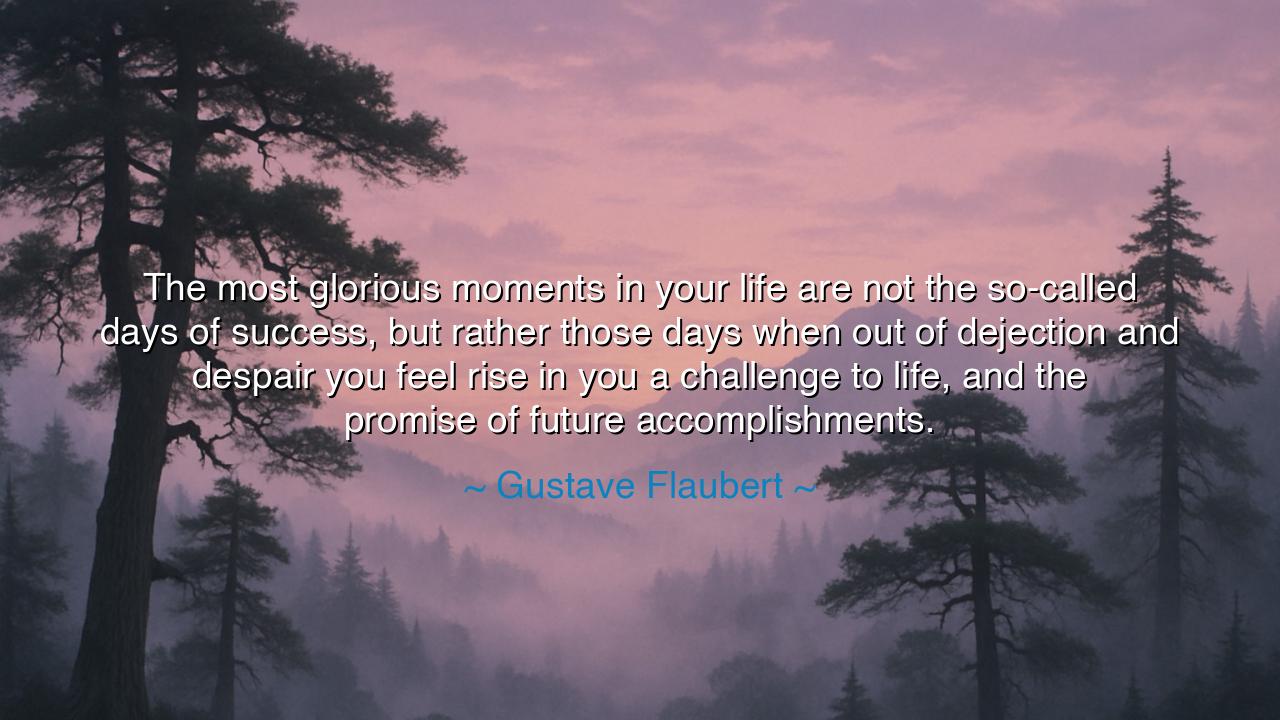
The most glorious moments in your life are not the so-called days
The most glorious moments in your life are not the so-called days of success, but rather those days when out of dejection and despair you feel rise in you a challenge to life, and the promise of future accomplishments.






"The most glorious moments in your life are not the so-called days of success, but rather those days when out of dejection and despair you feel rise in you a challenge to life, and the promise of future accomplishments." These words by Gustave Flaubert illuminate a powerful truth about the human condition. Flaubert suggests that our greatest moments are not found in the celebration of success, but in the quiet resilience that emerges from struggle and defeat. The true measure of strength lies in our ability to rise from the depths of despair—to find the spark of hope even when everything seems lost. It is through these moments of challenge that the promise of future accomplishments is born.
In the ancient world, the notion that adversity shapes character was not a new one. The Greeks, in particular, valued the concept of arete, which referred to the pursuit of excellence and virtue. For the Greeks, true greatness was not achieved by a life of ease, but through struggle and overcoming obstacles. The hero in Homer’s epics—whether Achilles in The Iliad or Odysseus in The Odyssey—was tested not in the moments of triumph, but in the depths of their despair and suffering. It was through these hardships that they found their strength, developed wisdom, and ultimately earned their place in history. In this sense, Flaubert’s idea of the most glorious moments being born of dejection resonates deeply with the ancient Greek understanding of heroism.
Similarly, the Stoics, like Seneca and Marcus Aurelius, believed that true greatness was forged in times of adversity. Seneca often wrote that it was in moments of difficulty that we discover our true character, as he believed that external circumstances do not define us—our internal response does. Seneca wrote, "A gem cannot be polished without friction, nor a man perfected without trials." For the Stoics, struggle was not something to avoid, but something to embrace as a pathway to virtue. The Stoic hero is not someone who avoids hardship, but someone who faces it with courage, emerging from the experience stronger and more virtuous. Flaubert’s words echo this Stoic belief, suggesting that it is not success alone that defines us, but our ability to endure and persevere through moments of despair.
Consider the story of Thomas Edison, whose life exemplifies Flaubert’s idea that greatness arises from adversity. Edison is famously known for inventing the light bulb, but his journey was not a smooth one. He faced countless failures, and his experiments often resulted in devastating setbacks. Yet, each time he faced failure, he did not see it as the end but as an opportunity to learn and grow. In fact, Edison is reported to have said, "I have not failed. I've just found 10,000 ways that won't work." His greatness came not from a series of successes, but from his refusal to give in to despair. Like Flaubert’s vision, Edison’s greatest triumphs emerged from challenges that seemed insurmountable at the time. The promise of future accomplishments was forged in the heat of his despair and failure.
This same idea can be seen in the life of Nelson Mandela. After spending 27 years in prison, Mandela emerged not broken, but as a symbol of hope and resilience for the people of South Africa. His long years of suffering in solitary confinement and facing injustice would have broken many, yet Mandela found strength in these moments. It was in the midst of his darkest hours that he realized that his struggle was not just for himself, but for the future of his country. Mandela’s ability to rise above despair, to remain hopeful and determined, ultimately led to the end of apartheid and the establishment of a new, unified South Africa. His story exemplifies Flaubert’s belief that the most glorious moments come not from success, but from the ability to rise from despair and transform hardship into a promise for the future.
The lesson we can draw from Flaubert’s words is this: it is in our moments of challenge and despair that we discover our true power. True greatness is not measured by how easily we achieve success, but by how we respond to adversity. The greatness of a person lies in their ability to persevere, to reframe failure as an opportunity for growth, and to find meaning in the midst of difficulty. Flaubert, like the ancient philosophers, understood that the most profound human experiences arise from our struggles, not our victories. It is through these moments of adversity that we become stronger, wiser, and more capable of achieving greatness.
In your own life, consider how you respond to hardship. Do you let moments of despair define you, or do you use them as opportunities to grow and evolve? Reflect on how you can reframe failure as a stepping stone toward future success. Like Edison and Mandela, choose to rise above adversity with courage, and recognize that the promise of your future is often born in the very moments when you feel the most challenged. Embrace the struggle—for in it lies the potential for your greatest accomplishments.






AAdministratorAdministrator
Welcome, honored guests. Please leave a comment, we will respond soon